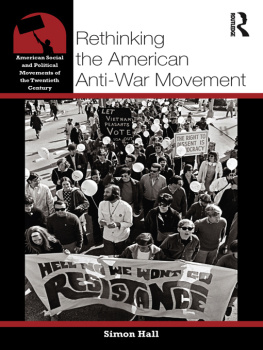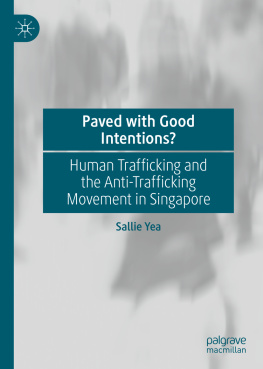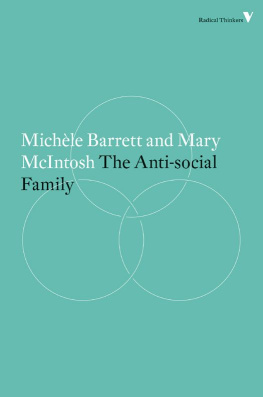Rethinking Anti-Discriminatory and Anti-Oppressive
Theories for Social Work Practice
From Christine: To Adi, Frania, Rivka and Shane. Without your support I could never do what I do.
From Trish: For the fabulous Ted and Katie Letchfield; such a great sense of humour, and thank you for your appreciation and support, I am so proud of you both.
Rethinking Anti-Discriminatory and Anti-Oppressive Theories for Social Work Practice
Edited by Christine Cocker and
Trish Hafford-Letchfield
Selection, editorial matter and introduction Christine Cocker and Trish Hafford-Letchfield 2014
Individual chapters (in order) Priscilla Dunk-West 2014; Lorraine Green and Brid Featherstone 2014; Siobhan E. Laird 2014; Shamser Sinha, Rachel Burr and Alex Sutton 2014; Fiona Kumari Campbell 2014; Stephen Cowden and Gurnam Singh 2014; Litea Meo-Sewabu 2014; Stephen A. Webb 2014; Sarah Carr 2014; Claudia Bernard and Jim Campbell 2014; Danielle Turney 2014; Paul Michael Garrett 2014; Stephen Hicks 2014; Dharman Jeyasingham 2014.
All rights reserved. No reproduction, copy or transmission of this publication may be made without written permission.
No portion of this publication may be reproduced, copied or transmitted save with written permission or in accordance with the provisions of the Copyright, Designs and Patents Act 1988, or under the terms of any licence permitting limited copying issued by the Copyright Licensing Agency, Saffron House, 610 Kirby Street, London EC1N 8TS.
Any person who does any unauthorized act in relation to this publication may be liable to criminal prosecution and civil claims for damages.
The authors have asserted their rights to be identified as the authors of this work in accordance with the Copyright, Designs and Patents Act 1988.
First published 2014 by
PALGRAVE MACMILLAN
Palgrave Macmillan in the UK is an imprint of Macmillan Publishers Limited, registered in England, company number 785998, of Houndmills, Basingstoke, Hampshire RG21 6XS.
Palgrave Macmillan in the US is a division of St Martins Press LLC, 175 Fifth Avenue, New York, NY 10010. Palgrave Macmillan is the global academic imprint of the above companies and has companies and representatives throughout the world.
Palgrave and Macmillan are registered trademarks in the United States, the United Kingdom, Europe and other countries
ISBN: 978-1-137-02397-1
This book is printed on paper suitable for recycling and made from fully managed and sustained forest sources. Logging, pulping and manufacturing processes are expected to conform to the environmental regulations of the country of origin.
A catalogue record for this book is available from the British Library.
A catalog record for this book is available from the Library of Congress.
Typeset by Cambrian Typesetters, Camberley, Surrey
Printed in China
Contents
Christine Cocker and Trish Hafford-Letchfield
Priscilla Dunk-West
Lorraine Green and Brid Featherstone
Siobhan E. Laird
Shamser Sinha, Rachel Burr and Alex Sutton
Fiona Kumari Campbell
Stephen Cowden and Gurnam Singh
Litea Meo-Sewabu
Stephen A. Webb
Sarah Carr
Claudia Bernard and Jim Campbell
Danielle Turney
Paul Michael Garrett
Stephen Hicks
Dharman Jeyasingham
Foreword
Helen Cosis Brown
Christine Cocker and Trish Hafford-Letchfields book, a collection of 14 edited chapters, is a much needed contribution to social work thinking, both in practice and in the academy. Anti-discriminatory practice is a contested area of social works doing, as well as thinking. This book makes a purposeful intervention into this contested terrain to stimulate debate and the development of ideas. The books value lies in four aspects of its conception and realisation.
First, one of the pleasures, and indeed strengths, of an edited text is that it affords the reader different perspectives relating to a subject. Alongside strengths there are sometimes weaknesses. A potential weakness with edited books is when different perspectives translate into disparate, unconnected chapters that do not come together as a coherent whole. This is not the case with this edited social work text. The structure of this book has mitigated any such risk by employing two devices. The first being the sub-grouping of the books 14 chapters into four sections related to the postmodern, poststructural themes of: power, discourse, subjectivity and deconstruction. The second being editorial comment at the beginning of each section offering, as it does, continuity and coherence to the whole enterprise.
Second, the contributions are drawn from Australia, Ireland, New Zealand and the United Kingdom (UK). This geographical and political range means that differences in the development of ideas, and how these ideas are applied and explored in practice, are evident. Deconstructing the potential generalised debate about ADP in the UK is enabled by Bernard and Campbells focus on Northern Ireland through examining the specificity of social work practice in that setting.
Third, the book has a particular theoretical palette, drawing as it does chiefly on the work of Foucault. Although the work of Foucault is fore fronted, there are a range of other theoreticians manifest in the book, including: Derrida, Badiou, Butler and even Althusser, who as a Marxist might have been considered too modern for such a postmodern/poststructural text. This theoretical focus enables theoretical depth, similar to an oil painting with its many-layered profundity.
Fourth, this is a book about ideas informing social work thinking. Because social work is in essence a doing occupation/profession then to be useful these ideas have to be translatable into practice. Here lies one ubiquitous, perennial tension between social work academia and sites of social work activity. However, there are examples of how, what are in effect highly complex philosophical, social, cultural, and political ideas can inform practice in chapters such as Garrett, Turney, Green and Featherstone, and Laird. Cowden and Singhs chapter reminds us of the need to deconstruct and read as text service user involvement, which, like anti-discriminatory practice, has become an integral, established part of the status quo. Social work has to be measured by its ability to both enhance the life chances and quality of life of those it works with, and minimise its potential damage to those involved with its interventions. Carrs chapter denotes the realities of the constructed categories and artificial divides between those that receive or have services imposed upon them, health and social care professionals, social workers, researchers, and academics. The embodiments of each are often not separated, but rather are components of the same person. This realisation reminds us that, firstly, social work is a human activity, working with human experience and emotion and, secondly, that our neo-liberal preoccupation with difference has lessened our focus on sameness.
Social work involvement with individuals, networks and families can, and often does, have immense impact for those involved and the generations of individuals who come after. Social work involvement, for better or worse becomes part of the narratives of individuals, networks and families. As social workers we therefore need to tread with great care, kindness, humility and critical thought. This book offers much to inform that thought.







